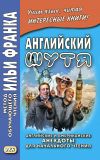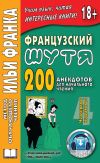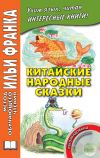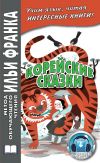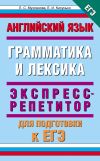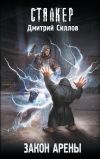
Автор книги: Виктор Миловидов
Жанр: Иностранные языки, Наука и Образование
Возрастные ограничения: +12
сообщить о неприемлемом содержимом
Текущая страница: 1 (всего у книги 20 страниц) [доступный отрывок для чтения: 7 страниц]
В.А. Миловидов
Английский разговорный шутя
100 самых смешных анекдотов на лучшие разговорные темы
Учебное пособие
От автора-составителя
Такой вот анекдот:
«…Засорилась канализация. Подходят к канализационному люку двое: старый квалифицированный слесарь и молодой ученик. Открывают, а колодец – полнехонек.
Старый деловито спускается в колодец, через минуту выныривает.
– Дай-ка ключ на восемнадцать!
Молодой подает ключ, старый ныряет снова. Опять появляется на поверхности:
– Дай-ка на шестнадцать!
Скрывается в колодце.
Через пять минут канализация исправлена. Старый вылезает, отряхивается, снисходительно смотрит на молодого.
– Вот, – говорит, – сынок, учись! А то так и будешь всю жизнь ключи подавать…»
Я рассказал этот анекдот своему давнему знакомому Рону Андерсу, профессору славистики Мичиганского университета. Тот посмеялся, потом спросил:
– А что в колодце?
Я сказал. Рон спросил:
– И часто в России употребляют это слово?
– На каждом шагу, – ответил я.
Рон с опаской посмотрел себе под ноги (мы шли по Ленинскому), потом на меня.
– Я смотрел твои книжки, – сказал он. – Ты и твои коллеги учите хорошему английскому. Но так говорят, – он задумался, – на похоронах. А живые люди – те, что на улице, – у них другой язык. Такой, как… в твоем колодце!
– К тому же, – продолжал он, – когда вы учите иностранные языки, у вас такие мрачные физиономии, как будто это дело государственной важности. А серьезными вещами надо заниматься с улыбкой – тогда и толку будет больше. Читайте анекдоты, учите их наизусть, рассказывайте друг другу. Там самый что ни на есть нормальный язык. Вот, смотри…
И, помолчав, Рон начал:
"…A construction worker goes to the doctor and says, «Doc, I'm constipated.»
The doctor examines him for a minute and then says, «Lean over the table.»
The construction worker leans over the table, the doctor whacks him on the ass with a baseball bat, CRACK… and then sends him into the bathroom.
He comes out a few minutes later and says, «Doc, I feel great. What should I do to prevent constipation in the future?»
The doctor says, «Stop wiping with cement bags!»
Когда я отсмеялся, то спросил:
– Does «wiping» mean «a hygienic procedure enabling one to keep his or her anus clean after»…
Я замялся.
Рон посмотрел снисходительно:
– Да, Россия – культурная страна. А остальные слова ты знаешь?
– А то, – гордо ответил я.
Тогда, остановившись прямо посредине тротуара, Рон сказал:
– Пусть и другие знают. Сделай такую книжку. Пусть там будет все как в обычном учебнике: и упражнения, и грамматика, и словарь. Но пусть там будет и нормальный, живой английский – тот, которым говорят на улице, дома…
– В курилке, – подсказал я.
– Ну уж нет! – возразил Рон. – У нас не курят.
И пошел к памятнику Ленина.
А я вернулся домой и сел за книжку.
Она перед вами.
В книжке три части. Первые две части – семьдесят английских смешных историй и анекдотов. Почти «Декамерон» или «Кентерберийские рассказы».
В первой части читаете анекдоты, повторяете грамматику, учите слова и фразеологию, делаете упражнения.
Вторая часть – большой массив текстового материала. Здесь закрепляете то, что усвоили из первой части, и… просто смеетесь.
Третья часть – готовитесь к тому, чтобы, поехав куда-нибудь в англоязычную страну, стать душой компании. Посмеялись сами – дайте посмеяться другим. А иметь в запасе десяток-другой русских анекдотов, но в хорошем английском изложении – это не хуже дипломатического паспорта.
Итак, в третьей части вы самостоятельно излагаете по-английски тридцать русских текстов, пользуясь теми словами и выражениями, что узнали из первых двух частей.
В конце – как и положено – грамматический комментарий, список использованных выражений и словарь с транскрипцией.
Пособием можно пользоваться как в одиночку, так и группами, а также под руководством преподавателя – будет еще смешнее!
Итак, посмеемся? Учиться развлекаясь – не худший способ учиться.
Part I
Reading and grammar
Section 1
Randy

A farmer wanted to have his hens serviced, so he went to the market looking for a rooster. He was hoping he could get a special rooster, one that would service all of his many hens, and when he told this to the market vendor, the vendor replied, «I have just the rooster for you. Randy here is the horniest rooster you will ever see!»
So the farmer took Randy back to the farm. Before setting him loose in the henhouse though, he gave Randy a little pep talk. «Randy,» he said, «I'm counting on you to do your stuff.» And without a word Randy strutted into the henhouse.
Randy was as fast as he was furious, mounting each hen like a thunderbolt. There was much squawking and many feathers flying, till Randy had finished having his way with each hen. But Randy didn't stop there, he went into the barn and mounted all the horses, one by one and still at the same frantic pace. Then he went to the pighouse, where he did the same.
The farmer, watching all of this with disbelief, cried out, «Stop, Randy, you'll kill yourself.» But Randy continued, seeking out each farm animal in the same manner.
Well, the next morning, the farmer looked out and saw Randy lying there on his lawn. His legs were up in the air, his eyes rolled back, and his long tongue hanging out. A buzzard was already circling above Randy.
The farmer walked up to Randy saying, «Oh you poor thing, look what you did, you've gone and killed yourself. I warned you, my little buddy.»
«Shhhhh!» Randy whispered. «The buzzard's getting closer.»
Study the words and expressions given below:
to service обслуживать; зд. с.-х. огуливать, топтать, покрывать
rooster петух
vendor продавец
horny рогатый; зд. сленг озабоченный, похотливый
pep сленг энергичный
stuff зд. работа, работенка
strut ходить с гордым, напыщенным видом
furious яростный
to mount взбираться
squawk пронзительно кричать, верещать
feathers перья
frantic неистовый, разъяренный
расе скорость, темп
buzzard сарыч
buddy сленг приятель
he wanted to have his hens serviced он хотел, чтобы его кур покрыли (have sth done букв. устроить так, чтобы кто-то сделал что-л. для тебя)
to set sb loose освободить кого-л., дать кому-л. волю
to give sb a little talk поговорить с кем-л.
to count on sb рассчитывать на кого-л.
there was much squawking было много кудахтанья
to have one's way with покончить с кем-л.
to finish having закончить делать что-л.
in the same manner тем же способом, в той же манере
to roll back закатить (глаза)
to get closer приблизиться
Exercises to the text
1. Answer the questions to the text:
1. Why did the farmer go to the market?
2. What sort of a rooster did he want to have?
3. What did the farmer tell Randy before setting him loose?
4. Where did Randy go after he had finished his way with the hens?
5. What was the farmer afraid of?
6. What did the farmer think when he saw Randy lying on the lawn?
7. What do you think Randy would do after he had finished with the buzzard? Don't you think the farmer is in danger?
2. Fill in the blanks with the words from the text:
1. A farmer wanted to have his hens _______.
2. He was hoping he could get a _______ rooster.
3. Before setting him _______, he gave him a little talk.
4. He mounted all the horses at the same _______ pace.
5. In the pighouse he did _______.
6. His legs were _______ in the air, his eyes rolled_______.
7. A buzzard was already _______ above Randy.
8. The buzzard's _______ closer.
3. Say if the statement is true or false:
1. A farmer wanted to have his pigs serviced.
2. Randy here is the horniest rooster you will ever see.
3. So the farmer took Randy to the farm.
4. Before setting him loose, he had a long talk with Randy.
5. Having finished his way with each hen, Randy stopped.
6. The farmer, watching all of this, cried out, «O.K., Randy, carry on!»
7. A buzzard was circling above Randy.
4. Match the words and expressions in the left column to those in the right one:

5. Translate from Russian into English:
1. Он отправился на рынок в поисках петуха.
2. У меня как раз есть для тебя петух.
3. Я рассчитываю на тебя, что ты сделаешь свою работенку.
4. Ни слова не говоря, Рэнди с гордым видом направился в курятник.
5. Было много пронзительный криков и летящих перьев.
6. Рэнди закончил свои дела с каждой курицей.
7. Фермер смотрел на это все с недоверием.
8. Бедняга, ты убил себя. Я тебя предупреждал.
Revise English Grammar
Любое предложение в английском языке, содержащее существительное, включает в свой состав и артикль – определенный, неопределенный или «нулевой»: А (неопределенный артикль) farmer wanted to have his («нулевой» артикль) hens serviced, so he went to the (определенный артикль) market looking for a rooster…
Проверьте свои навыки использования артикля, при необходимости обращаясь к грамматическому комментарию (раздел 1).
6. Insert articles where necessary:
1. _______ farmer wanted to have his _______ hens serviced, so he went to _______ market looking for _______ rooster.
2. He wanted to find _______ very good rooster to service all his _______ hens, and when he told this to _______ market vendor, man answered. «I've just _______ rooster for you.»
3. "Randy here i is greatest rooster you might have ever seen!"
4. So farmer took Randy back to the farm.
7. Render the joke.
Section 2
The Burglar
A burglar had broken into a house late at night, in total darkness. He was working his way through the house making no noise when he heard a voice. He stopped and listened for a while and heard nothing. He continued his journey through the rooms looking for the one with all the «goodies» when he heard a voice again. This time he could faintly understand it. The voice said, «I see you and Jesus sees you.»
This made the burglar just freeze, and he waited to see what would happen. Nothing, the burglar heard nothing for some time and resumed his search. Just then he heard the voice again, much louder this time, it said, «I see you and Jesus sees you.» This was puzzling to the burglar and he was about equally curious and scared, so he began working his way toward the voice. He entered another room and a voice in the room said, «I see you and Jesus sees you.»
This scared the hell out of the burglar, and he just stood there motionless for about five minutes and heard no further noises. He then felt around and found a light switch and turned it on. There was a large bird cage with a parrot sitting in it. The parrot looked at the burglar and said, «I see you and Jesus sees you.» The burglar just grinned and went to work filling his bag and left the light in the room on. He had his bag about half full when he turned to look at the parrot again, this time he noticed that a Doberman Pincher was lying under the table that the bird cage was on. The parrot stared at the burglar and then said, «Sick him, Jesus.»
Study the words and expressions given below:
burglar взломщик
total полный; полностью
"goodies" сленг добро
faint слабый
to freeze замораживаться, застывать
to resume возобновлять, приниматься снова
search поиск
to puzzle ставить в тупик
equal равный
curious любопытный
to scare пугать
motionless неподвижный
switch выключатель
parrot попугай
to grin усмехаться, ухмыляться
for a while в течение некоторого времени
to break into вломиться
to work one's way through (toward) прокладывать путь через (к)
to scare the hell out of sb чертовски испугать
to have sth about half full иметь что-л. наполненным наполовину
to feel around пощупать вокруг
Sick him! Взять! / Фас!
Exercises to the text
1. Answer the questions to the text:
1. What did the burglar hear when he was working his way through the house?
2. What room was he looking for?
3. What did the voice say?
4. What did the burglar feel around for?
5. Who was sitting in the cage?
6. Who was lying under the table that the bird cage was on?
7. What do you think happened to the burglar after the parrot had ordered the Pincher to do his stuff?
2. Fill in the blanks with the words from the text:
1. He waited to see what ______ happen.
2. The burglar heard nothing and ______ his search.
3. This was ______ to the burglar and he was about ______ curious and scared.
4. He began ______ his way toward the voice.
5. This scared ______ out of the burglar.
6. He ______ around and found ______ and turned it on.
7. The parrot looked at the burglar and said, «I see you and ______ sees you.»
3. Match the two parts of each sentence:

4. Match the words and expressions in the left column to those in the right one:

5. Translate from Russian into English:
1. Взломщик вломился в дом поздно ночью, в полной темноте.
2. Он остановился и прислушивался некоторое время.
3. Он стал искать комнату со всем добром.
4. Он едва понял эти слова.
5. Это заставило взломщика просто застыть.
6. Он возобновил свои поиски.
7. Взломщик был в равной степени испуган и заинтригован.
Revise English Grammar
В предложении The burglar stood motionless for about five minutes and heard no further noises слова minutes и noises стоят в форме множественного числа. Они образованы путем прибавления окончания – s к основе слов minute минута и noise шум.
Слово goodies также стоит во множественном числе, но образовано оно от слова goody и, очевидно, по другим правилам. По каким?
Проверьте свои навыки образования формы множественного числа имен существительных (для справки см. грамматический комментарий, раздел 2, с. 240).
6. Put the words from the text into Plural form and read them according to the rules:
burglar
hell
journey
bird
house
minute
room
cage
night
noise
time
parrot
way
light
search
bag
voice
switch
puzzle
table
7. Render the joke.
Section 3
Dead Dog

A woman goes to the vet. She says, «Doctor, I think there's something wrong with my dog. He hasn't moved all day.»
The vet examines the dog and says, «I'm sorry. I'm afraid your dog is dead.»
«Dead! How can he be dead? He was just fine yesterday. Are you sure he's dead? Isn't there some other test you can run?»
The vet leaves and returns in a moment with a pet carrying case. He opens the case and a large cat emerges. The cat plods over to the dog and sniffs around its head. It then circles the dog, sniffing and poking around. After a minute or two the cat returns to its cage.
«Well,» says the vet, «that pretty much proves it. He's dead.»
«I guess you're right,» says the woman. She is coming to grips with what happened. «At least you did your best. How much do I owe you?»
«$230.»
«$230?! For what? All you did was tell me my dog was dead. What did you do that costs $230?»
«Well it's $30 for the office visit,» says the vet, «and $200 for the cat scan.»
Study the words and expressions given below:
vet сокр. разг. veterinary ветеринарный врач
to emerge появляться, возникать
to plod тащиться, передвигаться с трудом
to sniff нюхать, обнюхивать
to poke тыкать; совать(ся)
grip захват; способность понять, осознать что-л.
to guess догадываться
to owe быть должным
to scan сканировать, исследовать
to run a test провести анализ
that pretty much proves it разг. это со всей очевидностью доказывает это
to come to grips with sth осознавать, понять
to do one's best сделать все, на что способен
office visit посещение; зд. прием (у врача)
cat scan сканирование с применением кота
at least по крайней мере
Exercises to the text
1. Answer the questions to the text:
1. What does the woman think about her dog?
2. What did the vet return with?
3. In what way did the cat perform his test?
4. How much did the doctor think the woman owed him?
5. How much was the cat scan?
2. Fill in the blanks with the words from the text:
1. How can he _______ dead?
2. «Isn't there some other test you can _______?»
3. The vet _______ and returns with a case, and a large
cat.
4. The cat _______ around the dog's head.
5. After a minute or _______ the cat returns.
6. I _______ you're right.
7. At _______ I did my best.
8. How much do I _______ you?
9. All you did was perform a cat _______.
3. Say if the statements are false or true:
1. The dog hasn't moved all week.
2. The vet says, «I'm sorry. I'm afraid your dog is ill.»
3. He was just fine yesterday.
4. The vet leaves and never returns.
5. He opens the case and a large cat emerges.
6. After a minute or two the vet returns to its cage.
7. «How much do I owe you?» – «$530.»
4. Match the words and expressions in the left column to those in the right one:


5. Translate from Russian into English:
1. Доктор, я думаю, с моей собакой что-то неладно.
2. Она целый день не двигалась.
3. Доктор осмотрел собаку.
4. Вы уверены, что она умерла?
5. Нет ли других анализов, которые вы могли бы провести?
6. Он открыл коробку, и появился большой кот.
7. Кот понюхал вокруг собачьей головы.
8. Что вы сделали такого, что стоит 230 долларов?
6. Find English equivalents to the Russian words in the scanword. The hidden words are positioned both horizontally and vertically, as well as on diagonals:

1. (r…) петух, 2. (f…) перья, 3. (с…) любопытный, 4. (m…) неподвижный, 5. (s…) включать, 6. (f…) замерзать, 7. (s…) обслуживать, 8. (f…) яростный, 9. (r…) возобновлять, 10. (е…) появляться.
Revise English Grammar
В предложениях A woman goes to the vet; Doctor, I think there's something wrong with my dog используется так называемое простое настоящее время;
в предложении Не hasn't moved all day — настоящее совершенное время;
в предложении She is coming to grips with what happened — настоящее длительное время.
Проверьте, правильно ли вы используете три основные формы настоящего времени (в случае необходимости воспользуйтесь грамматическим комментарием; раздел 3).
7. Fill in the blanks with appropriate Present forms of the verbs given in brackets:
1. The woman (to visit)the vet every other day.
2. The dog (not to move)since yesterday.
3. The vet (to examine)the dog at the moment.
4. (to be) my dog dead?
5. What test you (to run)now?
6. "I (to leave) at the moment, and will return in a minute," said the vet.
7. "What you (to carry) in this case?" asked the woman.
8. I (to open) this case every morning.
9. You (ever to see) such a cat before?
10. No, I (never to see) such a cat in all my life.
11. What he (to sniff) around at present?
12. Why he (to circle) my dog?
13. How much I (to owe) you?
Revise English Grammar
Женщина, пришедшая к ветеринару, задает множество вопросов, которые подразделяются на несколько видов:
Основные виды вопросительных предложений – общий и специальный вопросы.
Проверьте навыки постановки данных вопросов, при необходимости обращаясь к грамматическому комментарию; раздел 3.
8. Make general questions to the sentences given below:
1. A woman goes to the vet.
2. There's something wrong with my dog.
3. He hasn't moved all day.
4. I'm afraid your dog is dead.
5. The vet leaves and returns in a moment.
6. He opens the case.
7. A large cat is emerging.
8. The cat is plodding over to the dog.
9. Make as many special questions as you can to the sentences given below:
1. The dog hasn't moved all day.
2. The vet leaves and returns in a moment.
3. After a minute or two the cat returns to its cage.
10. Render the joke.
Section 4
The Parrot And The Magician
A magician was working on a cruise ship in the Caribbean. The audience would be different each week, so the magician allowed himself to do the same tricks over and over again.
There was only one problem: the captain's parrot saw the shows each week and began to understand how the magician did every trick. Once he understood he started shouting in the middle of the show.
«Look, it's not the same hat.»
«Look, he is hiding the flowers under the table.»
«Hey, why are all the cards the Ace of Spades?»
The magician was furious but couldn't do anything; it was, after all, the captain's parrot.
One day the ship had an accident and sank. The magician found himself on a piece of wood in the middle of the ocean with the parrot, of course.
They stared at each other with hate, but did not utter a word. This went on for a day, and another and another.
After a week the parrot said. «OK, I give up. Where's the boat?»
Study the words and expressions given below:
magician фокусник
cruise круиз
to stare уставиться
to allow oneself позволять себе
over and over again снова и снова
to start shouting начинать кричать
the Ace of Spades карт. туз пик
to utter a word произносить слово
to give up сдаваться
Exercises to the text
1. Answer the questions to the text:
1. What sort of a ship the magician was working on?
2. What did the magician allow himself to do each week?
3. What did the captain's parrot begin to understand?
4. What did he shout in the middle of the show?
5. Why couldn't the magician do anything?
6. Where did the magician find himself after the ship had sunk?
7. Why did the parrot give up?
2. Fill in the blanks with the words from the text:
1. The ______ would be different each week.
2. The magician allowed himself to do ______ tricks.
3. Once the parrot understood he started ______.
4. Look, he is ______ the flowers.
5. The magician was ______ but couldn't do anything.
6. One day the ship had an ______ and sank.
7. They ______ at each other with hate.
3. Match the two parts of each sentence:

4. Match the words and expressions in the left column to those in the right one:

5. Translate from Russian into English:
1. Там была только одна проблема.
2. Попугай начал понимать, как фокусник делает свои фокусы.
3. Однажды поняв, он принялся кричать в середине представления.
4. Смотрите, он прячет цветы в шляпе.
5. Фокусник был в бешенстве, но он не мог ничего поделать.
6. В конце концов, это был попугай капитана.
7. Так продолжалось день, потом другой и еще один.
Revise English Grammar
В предложениях A magician was working on a cruise ship и The magician allowed himself to do the same tricks over and over again используются две основные формы прошедшего времени английского глагола – прошедшее длительное и прошедшее простое.
В вопросе Where did the magician find himself after the ship had sunk? используется третья основная форма прошедшего времени английского глагола – прошедшее совершенное время.
Проверьте свои знания этих временных форм (в случае необходимости используйте грамматический комментарий; раздел 4).
6. Fill in the blanks with appropriate forms of the verbs:
1. When the magician worked on a cruise ship he (to allow) _______ himself to do one and the same trick over and over again.
2. The magician (to hide) _______ the flowers under the table while he was doing his tricks.
3. There (to be) _______ only one problem yesterday.
4. There (to be) _______ three problems yesterday.
5. As soon as the captain (to see) _______ the show he started shouting at the magician.
6. He (to shout) _______ all day long.
7. After the ship (to sink) _______ the magician found himself on a log of wood.
8. When a week (to pass) _______, the parrot (to say) _______ that he was giving up.
7. Make as many special questions to the sentences given as possible:
1. A magician was working on a cruise ship in the Caribbean.
2. The captain's parrot began to understand how the magician did every trick.
3. He started shouting in the middle of the show.
4. He is hiding the flowers under the table.
5. The magician found himself on a piece of wood in the middle of the ocean with the parrot.
8. Render the joke.
Правообладателям!
Данное произведение размещено по согласованию с ООО "ЛитРес" (20% исходного текста). Если размещение книги нарушает чьи-либо права, то сообщите об этом.Читателям!
Оплатили, но не знаете что делать дальше?



